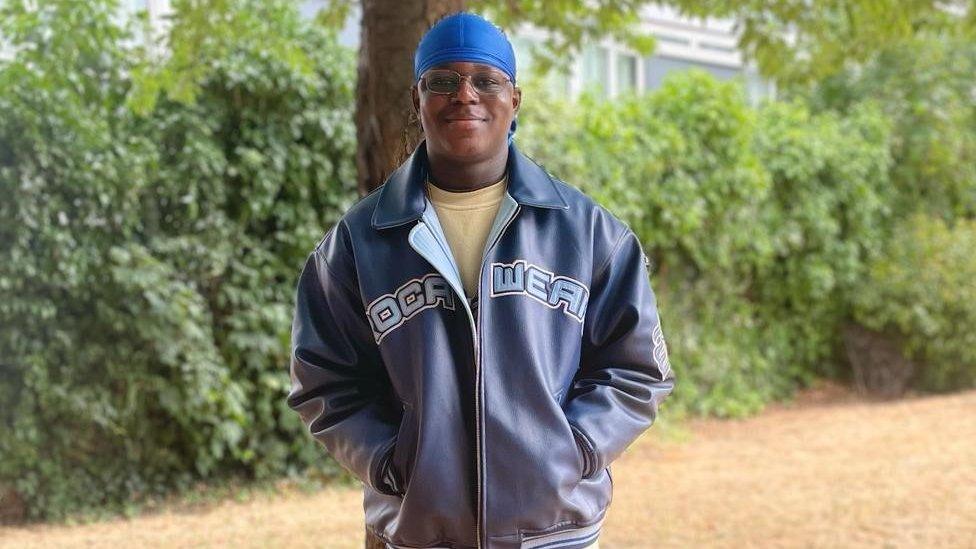First T-level students receive their results in England
- Published

Denzel, 18, said the students felt like the pioneers of their course
The first students to take T-levels have been receiving their results.
The new technical qualification started in 2020 with courses in education and childcare; design, surveying and planning; and digital production, taken by 1,029 students in England.
This year 92% of students achieved a pass or above and 370, or 71%, of those students who applied for a university course have so far been successful.
Many others have already secured an apprenticeship or a job.
This is according to the Institute for Apprenticeships and Technical Education.
There will be 16 T-level subjects available from September and more will be introduced over the next few years including accounting, agriculture and engineering.
However, there are some concerns that more BTecs will be cut to prevent overlapping.
Denzel, 18, who took T-levels in digital production, said he felt like his group were "the pioneers of this course".
He told the BBC it was very different to secondary school where you follow a curriculum and "there were no textbooks".
Although he says the course was a bit "hit and miss" at the beginning because it was new, by the end he and his classmates had enjoyed it and have now "mastered" it for the next batch of new students.
Denzel said a placement with the coding company Vector Ltd gave him a real feel for what the working world will be like.
He was awarded a merit and is going to the University of Hull to study software engineering.

What are T-Levels?
T-levels, or Technical Levels, have been developed alongside employers and are accepted by 120 universities.
Details on T-levels include:
They are two-year courses
One T-level is equivalent to three A-levels
They are 80% classroom learning and 20% industry placement
Placements are at least 315 hours (approximately 45 days)
Students are awarded a pass, merit, distinction or distinction*

T-level versus other qualifications
Darren Hankey, principal of Hartlepool College, says it looks as though the first cohort has had success in terms of achievement and progression to higher education.
Mr Hankey supports these new qualifications but worries about the programme's 45-day industry placement element .
"I don't think many parts of the country will have the economy to support these and, as a result, young people in these areas will miss out.
"For example, in the Tees Valley I reckon there are around 1,000 young people taking level 3 vocational qualifications in various engineering disciplines. I don't think we have the firms to support placements for this amount of students, as well as support apprentices."
'New quality criteria'
There are concerns that funding for some BTec qualifications will be removed in favour of the new T-levels.
BTecs - Business and Technology Education Council qualifications - are largely assessed through practical learning.
The ProtectStudentChoice campaign, external, which involves 30 organisations including the National Union of Students and the Association of School and College Leaders, says many young people will continue to be better served studying a BTec rather than an A-level or T-level-only study programme.
A Department of Education spokesperson said: "Students will continue to be able to study BTecs and other applied general qualifications where they meet new quality criteria and support progression to good outcomes."
Related topics
- Published18 August 2022

- Published11 May 2022
